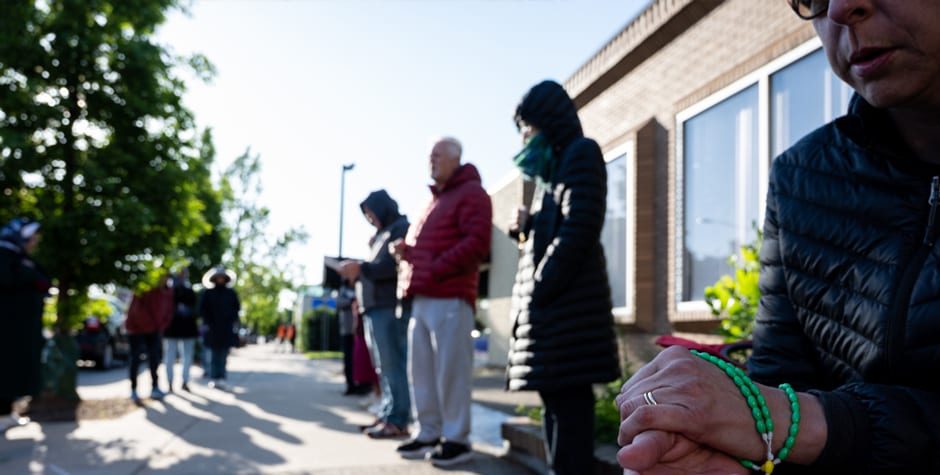ACLJ Sues Louisville Over Pro-Abortion Buffer Zone Law
Last year we told you about the City of Louisville’s failed attempt to crack down on pro-life sidewalk counseling using the COVID pandemic as cover. Then, the pro-abortion faction of the city council claimed that pro-lifers approaching and speaking with women entering Kentucky’s last abortion clinic was a public health nuisance that required the creation of a buffer zone. A buffer zone is basically a ban on pro-life speech within a certain distance from an abortion clinic, and it’s as unconstitutional as it sounds. Opponents of the law narrowly defeated the measure as dangerous and unnecessary, especially since any risk of virus spread was minimized in the outdoor setting. They also noted the rather hypocritical stance of the pro-buffer zone group since Louisville was, even then, experiencing nightly civil unrest and demonstrations by large crowds of unmasked people over the tragic shooting of Breonna Taylor. Were some forms of free speech freer than others?
But a new city council with a different political balance took up the buffer zone measure again this year. This year’s version of the ordinance made no mention at all of a public health emergency. Instead, this year’s version was all about an alleged history of blocking, obstruction, and harassment at “healthcare” facilities throughout the Louisville region. Curiously, however, the only facility mentioned in the ordinance was the EMW abortion clinic. Nevertheless, the council went ahead and enacted a “buffer zone ordinance” which sets up 10-foot-wide no-speech zones at every one of the dozens and dozens of healthcare facilities in Louisville and surrounding Jefferson County.
Our clients, Ed Harpring and Mary Kenney, have been sidewalk counseling outside the EMW clinic for decades. They are not there to “protest.” They are not there to “demonstrate.” They are there to offer women alternatives to abortion by engaging in personal, caring, consensual conversations and distribution of pamphlets and literature about various life-saving options.
Harpring says that at least 50 times a year, he and other counselors have been able to persuade women to change their minds about abortion, frequently on the last few steps of the public sidewalk just before they reach the clinic entrance. The new buffer zone eliminates that opportunity. Worse still, since the buffer zone goes from the clinic door to the curb, EMW now has most patients meet their volunteer abortion escorts at an off-premises location and shuttles them to the entrance of the buffer zone. Escorts then flank the patient as she walks toward the clinic, intercepting and discarding any literature the sidewalk counselors offer, making it impossible for sidewalk counselors to speak with the women in anything approaching a quiet or personal manner.
In its 2014 decision in McCullen v. Coakley, 573 U.S. 464 (2014) (a case in which the ACLJ filed a critical amicus brief), a unanimous Supreme Court – including such liberal stalwarts as Breyer, Kagan, Sotomayor, and “RBG” – declared that “sidewalk counseling” is the “essence of First Amendment expression” and that no form of speech is entitled to greater protection. The McCullen Court struck down a Massachusetts buffer zone law (remarkably similar to Louisville’s) on the grounds that it was not narrowly tailored since it burdened substantially more speech than necessary to advance the government’s legitimate interests. The Court held that, before any buffer zone regardless of size could be sustained, the government must show that it has tried or seriously considered and reasonably rejected alternative measures that would burden substantially less speech, not just that the chosen route of painted lines on the sidewalk excluding all speakers was easier to enforce.
In enacting its own buffer zone law, however, Louisville simply ignored the McCullen case. Instead, the city cited as its authority for its action an earlier Supreme Court case, Hill v. Colorado, 530 U.S. 703 (2000). Leaving aside the legally crucial distinction that Hill did not actually involve a fixed buffer zone, in the more recent McCullen decision, the Supreme Court pointedly ignored Hill, not citing it even once in its analysis of the constitutional principles to be used in evaluating such cases. Louisville also ignored everything the McCullen Court said about what steps a city must take – enforce existing laws, enact new, non-speech inhibiting laws, seek targeted injunctive relief – before it can even consider a law that cuts off part of a traditional public forum to sidewalk counselors.
Pretending McCullen never happened, however, won’t make it go away. That’s why the ACLJ has now filed a lawsuit on behalf of Ed Harpring and Mary Kenney, asking a federal district court to enjoin Louisville’s new buffer zone law as violative of both the Free Speech Clause of the First Amendment and the Due Process Clause of the Fourteenth Amendment. Protecting pro-life free speech has been at the core of the ACLJ’s work since its very beginning. Our Chief Counsel, Jay Sekulow, argued two of the most important cases in this area at the Supreme Court (see here and here); and over the years, ACLJ attorneys have represented pro-life sidewalk counselors in dozens of cases in federal and state courts across the country.
We cannot permit the crucial, lifesaving work of pro-life sidewalk counselors to be squelched by pro-abortion zealots and their political allies, especially when, as here, they simply ignore controlling Supreme Court precedent in the process of tearing up the First Amendment.
In addition to filing suit, we are asking the court to issue a preliminary injunction so that our clients will be able to exercise their free speech rights until the court issues a final ruling on the constitutionality of the ordinance. We will keep you posted as this important First Amendment case proceeds through the district court and perhaps, ultimately, to the U.S. Supreme Court.
